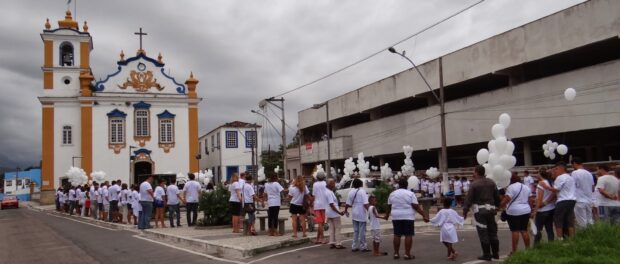
While the Brazilian national team suffered the worst defeat of all time, Magé—my hometown, located in the greater metropolitan region of Rio de Janeiro—grieved yet another murder. The sadness and outrage experienced while counting Germany’s goals are metaphors of a much greater tragedy: the apparent ineffectiveness of state public security policies on the outskirts of the state capital.
On the eve of Germany’s triumph over Brazil, all establishments in a neighborhood in central Magé were ordered to be closed; this was the mourning imposed by a criminal group for the death of a young man. On the same day, I spoke to a cousin who lives in the area where they imposed the curfew.
I asked my cousin how the situation was in his neighborhood. “It’s bad. In the last few days there was someone walking around with a gun in hand. They’re kids. If this keeps up, maybe we’ll sell the house and get out of there.”
I had never heard of a curfew being imposed in central Magé, but conversations about murders are becoming more frequent. Homicides are taking place in the city with a frequency as horrifying as that of Germany’s goals. Every day in Magé, with each new murder in the city, people also ask themselves “another one?!”
The list of some recent cases is frightening. In October, one person was killed and six injured in a shooting at the entrance of a nightclub. In November, a lawyer, her father and her mother were killed on their doorstep. In March, two people were killed and five injured in a pizzeria. Between April and May, two were killed in the same neighborhood. In May, a policeman was killed and two more were injured. In June, a number of people taking part in a festa junina event were killed and injured. At the end of June, a young man was killed in his girlfriend’s house.
Answers to who killed who and why are rare. Despite the investigations, most cases remain unexplained. Consequently, Magé is a city where rumors in the streets and on the Internet symbolize how misinformation and fear feed off each other. In the cases listed, it’s said that some victims were involved in gangs. Others, however, were uninvolved victims of the growing disputes between rival groups.
In conversations around the city, the disputes are identified as a consequence of the UPPs in the state capital. The issue of the migration of drug traffickers is controversial. State Secretary of Security, José Mariano Beltrame, claims there is no evidence of Carioca criminals escaping to other locations. But this official evaluation is inconsistent with the experience of those living in the outskirts of the capital. In the last few months, Magé residents have reported that many of the criminals are strangers. Additionally, in various neighborhoods graffiti has appeared with the acronyms of criminal factions belonging to the state capital. As a result, many residents of the city avoid visiting friends and family for fear of being identified as residents of rival districts.
Denying the migration of traffickers is a mistake, but attributing the increased crime just to new criminals is also problematic. Disputes and fights between neighborhoods have been happening for decades in Magé. The difference now seems to be the weapons available and the brutality of the clashes. Days after the murder of the policeman, I heard surprised reports of Military Police officers who work and live in the city. “Now they’re shooting rifles, man,” said a police officer, indicating there has been a shift in the way criminals in Magé act.
One reason for the increased violence in Magé is the way in which state policies are developed. A recent analysis of the official state violence indicators shows that the current security policy reduced homicides in the capital of Rio de Janeiro between 2007 and 2014. But outside the capital, despite the initial reduction, homicides are increasing. Today, almost as many are killed in the greater metropolitan area as were killed in 2007. In other words, outside the capital the state’s public security policies do not seem to have been as effective.
Safety measures were adopted during the World Cup in tourist districts, but the opposite is felt in Magé and on the periphery of the Marvelous City. As we watched in astonishment the “tragedy” of the Brazilian team in the field, another family cried over a real tragedy: another one killed. State public policies should not be limited to keeping residents and tourists in the “noble districts” calm. Otherwise, far from the beach and the stadiums, we will continue counting murders as we counted German goals.
Léo Custódio has an M.A. in Social Science and is a Ph.D. candidate at the School of Communication, Media and Theater at the University of Tampere, Finland. For his doctoral thesis (2009-2015), Custódio is investigating the media-activism of residents of favelas and the periphery of Rio de Janeiro.


